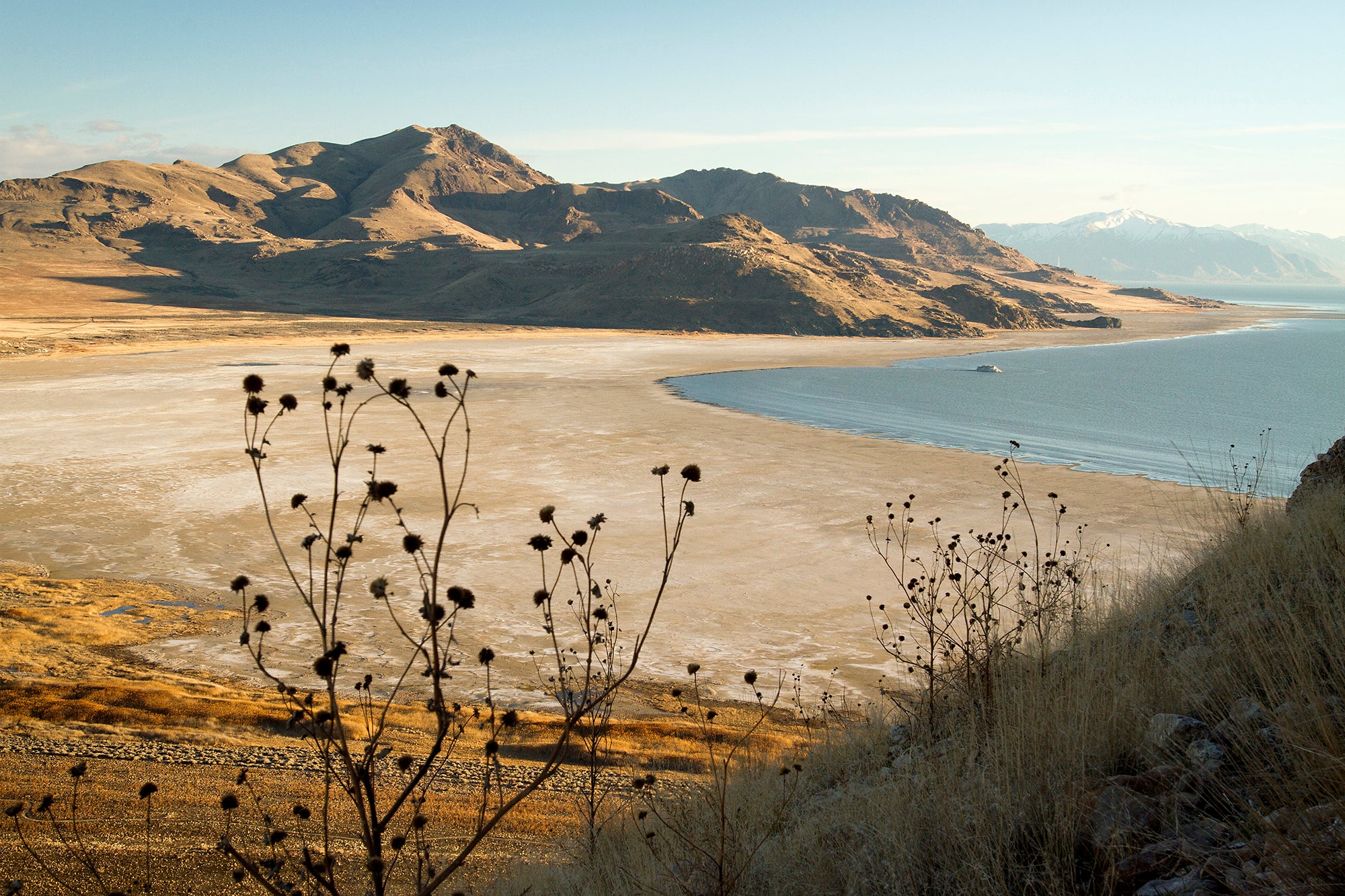Three-Dozen Law Professors File Amicus Brief in Support of Great Salt Lake Lawsuit
Professors argue public trust doctrine requires the state to intervene on excessive water use
Contact
The state of Utah has violated its fundamental legal duty to protect the Great Salt Lake against impairment due to dwindling water inflows, 36 law professors told a state court on Friday.
The professors asked the court to consider an amicus — or “friend of the court” — brief on Friday in support of conservation groups’ lawsuit against the state of Utah for its failure to ensure that enough water reaches the Great Salt Lake. The professors voiced their strong opposition to motions to dismiss that were filed by private water users, water conservancy districts, municipalities, and state agencies. In the brief, the professors argue that a legal rule known as the public trust doctrine, on which the lawsuit is based, requires the state to oversee the use of water – and to intervene where that water use is imperiling trust resources like the Great Salt Lake.
“The law professors’ amicus brief makes clear that the state is failing in its duty to protect the Great Salt Lake, and that the public trust doctrine requires it to take appropriate action,” said Stu Gillespie, senior attorney with Earthjustice. “The Great Salt Lake belongs to the people of Utah. It is time for the state to fulfill its obligation to protect this resource and address the unsustainable upstream water diversions that are putting it at risk, as well as the health of millions of Utahans.”
“The mountains east of Great Salt Lake have had above average snow packs the last two winters, but all too predictably our lawmakers have responded by dialing down their urgency to make the necessary policy changes to save the lake long term. Their failure to act only increases the urgency and necessity of our legal action,” said Dr. Brian Moench, president of Utah Physicians for a Healthy Environment.
The law professors, who are among the nation’s leading experts on the legal history and evolution of the public trust doctrine, state in their brief that “the state’s failure to apply Utah’s public trust doctrine (PTD) to protect the GSL [Great Salt Lake] against substantial impairment is a violation of the public’s right to a sustainable GSL.” The professors argue that the state’s view that the applicability of the public trust doctrine does not include public waters flowing into the lake “is contrary to both federal and state court interpretations of the PTD over the last century-and-a-half.”
“The state is offering Utahns lip service, baby steps and excuses for its failure to address dropping Great Salt Lake water levels,” said Zach Frankel, executive director of the Utah Rivers Council. “Utah continues to advance destructive new upstream water uses while it pretends it’s trying to save the lake, but everyone knows it can’t do both things at once.”
The law professors have published dozens of books, chapters, and articles on the public trust doctrine; have advised courts and governmental agencies on its applicability to natural resources; and have taught the doctrine to thousands of law students. They do not mince words: the state of Utah “has not come close” to meeting its public trust responsibilities. “Seeking voluntary measures from water users is insufficient to meet the state’s duty to ensure against the ‘substantial impairment’ of the Great Salt Lake while the lake continues to shrink and its ecosystem is undergoing collapse.”
“The Great Salt Lake is irreplaceable for the millions of saline-dependent birds including Wilson’s Phalaropes, Eared Grebes, Marbled Godwits, and American White Pelicans that need it for survival,” said Michael J. Parr, president of American Bird Conservancy. “The state has a responsibility to preserve the Great Salt Lake while we still have the chance.”
The professors conclude their brief by reminding the court that the Great Salt Lake’s future is not beyond legal remedy, and that the public trust doctrine supplies a path toward a resolution. The professors note that “the state clearly has the authority to undertake water conservation measures necessary to restore the Lake.”
“The lack of action on water conservation during the recent legislative session is yet another example of Utah’s refusal to meaningfully address this crisis,” said Maria Archibald, lands and water programs senior coordinator with the Utah Chapter of the Sierra Club. “The state has the power to protect and restore the Great Salt Lake, but has demonstrated yet again that it will not do so voluntarily.”
Conservation groups filed a 135-page response to the numerous motions to dismiss in the suit on April 26. The groups argue that the public trust doctrine is firmly rooted in the law and that defendants’ attempt to limit the doctrine to only lands, but not the waters overlying those lands, would put the Utah district court at odds with courts in every other state in the nation. The conservation groups also opposed defendants’ attempt to transform water appropriations into an absolute privilege, beyond any state oversight — an extreme position that will lead to the ecological collapse of the Great Salt Lake.
Earthjustice is representing Utah Physicians for a Healthy Environment, American Bird Conservancy, Center for Biological Diversity, Sierra Club, and Utah Rivers Council in the suit.

Additional Resources
About Earthjustice
Earthjustice is the premier nonprofit environmental law organization. We wield the power of law and the strength of partnership to protect people's health, to preserve magnificent places and wildlife, to advance clean energy, and to combat climate change. We are here because the earth needs a good lawyer.